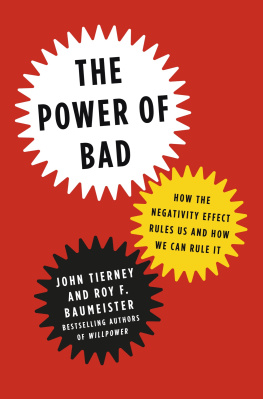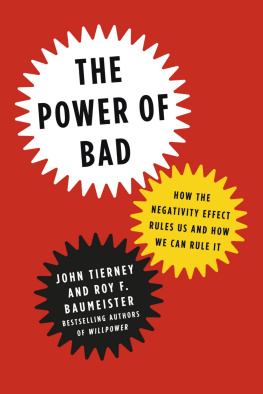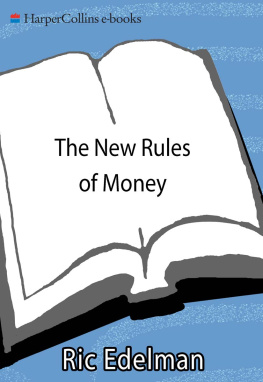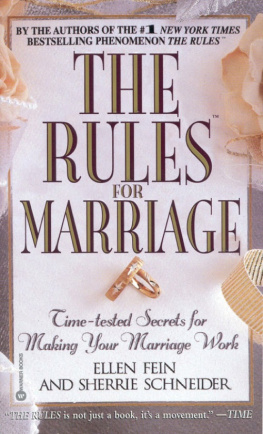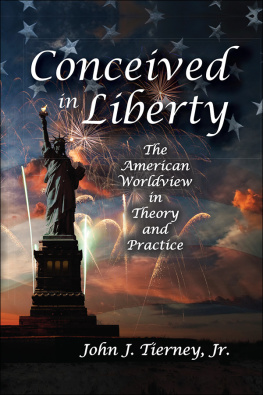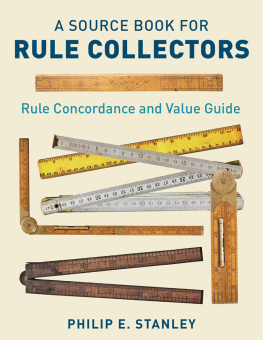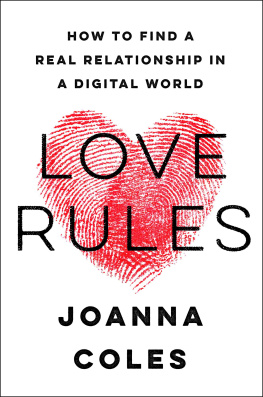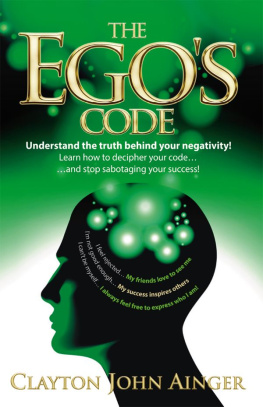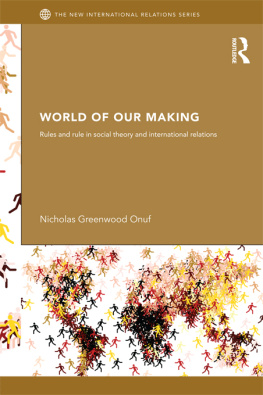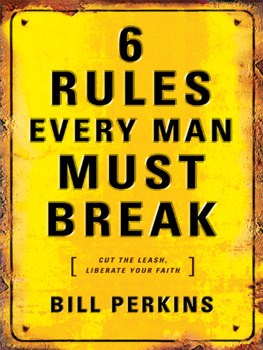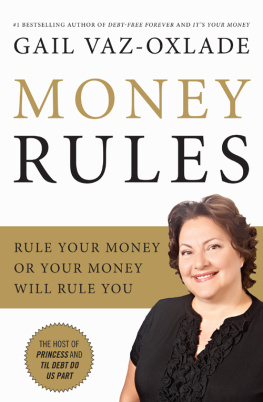John Tierney - How the Negativity Effect Rules Us and How We Can Rule It
Here you can read online John Tierney - How the Negativity Effect Rules Us and How We Can Rule It full text of the book (entire story) in english for free. Download pdf and epub, get meaning, cover and reviews about this ebook. year: 2019, publisher: Penguin Publishing Group, genre: Politics. Description of the work, (preface) as well as reviews are available. Best literature library LitArk.com created for fans of good reading and offers a wide selection of genres:
Romance novel
Science fiction
Adventure
Detective
Science
History
Home and family
Prose
Art
Politics
Computer
Non-fiction
Religion
Business
Children
Humor
Choose a favorite category and find really read worthwhile books. Enjoy immersion in the world of imagination, feel the emotions of the characters or learn something new for yourself, make an fascinating discovery.
- Book:How the Negativity Effect Rules Us and How We Can Rule It
- Author:
- Publisher:Penguin Publishing Group
- Genre:
- Year:2019
- Rating:4 / 5
- Favourites:Add to favourites
- Your mark:
- 80
- 1
- 2
- 3
- 4
- 5
How the Negativity Effect Rules Us and How We Can Rule It: summary, description and annotation
We offer to read an annotation, description, summary or preface (depends on what the author of the book "How the Negativity Effect Rules Us and How We Can Rule It" wrote himself). If you haven't found the necessary information about the book — write in the comments, we will try to find it.
John Tierney: author's other books
Who wrote How the Negativity Effect Rules Us and How We Can Rule It? Find out the surname, the name of the author of the book and a list of all author's works by series.
How the Negativity Effect Rules Us and How We Can Rule It — read online for free the complete book (whole text) full work
Below is the text of the book, divided by pages. System saving the place of the last page read, allows you to conveniently read the book "How the Negativity Effect Rules Us and How We Can Rule It" online for free, without having to search again every time where you left off. Put a bookmark, and you can go to the page where you finished reading at any time.
Font size:
Interval:
Bookmark:
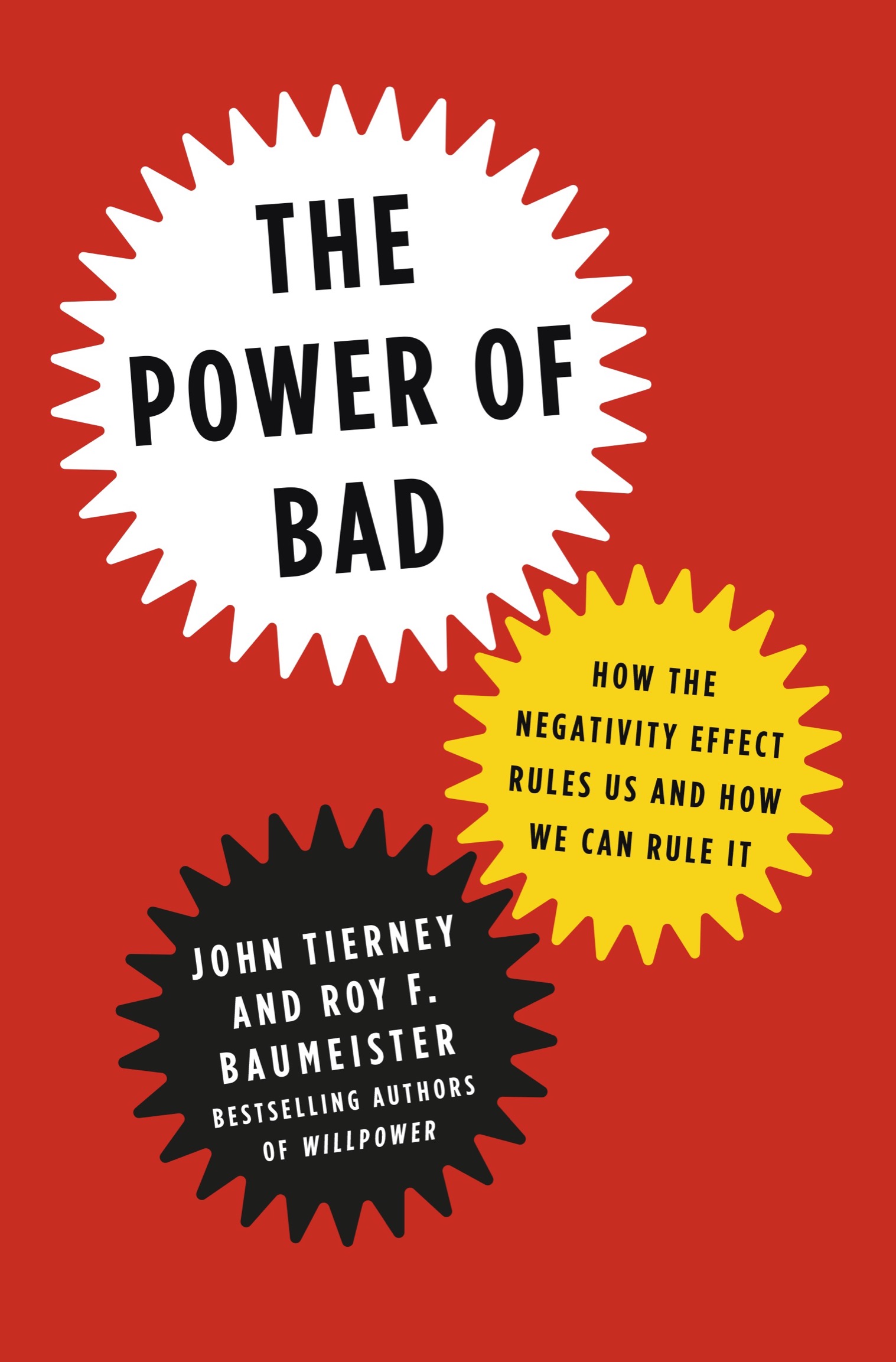
Willpower: Rediscovering the Greatest Human Strength
God Is My Broker: A Monk-Tycoon Reveals the 7 Laws of Spiritual and Financial Growth (with Christopher Buckley)
The Best-Case Scenario Handbook
Meanings of Life
Evil: Inside Human Violence and Cruelty
The Cultural Animal: Human Nature, Meaning, and Social Life
Is There Anything Good About Men? How Cultures Flourish by Exploiting Men
Homo Prospectus (with Martin E. P. Seligman, Peter Railton, and Chandra Sripada)
Losing Control: How and Why People Fail at Self-Regulation (with Todd Heatherton and Dianne M. Tice)
Breaking Hearts: The Two Sides of Unrequited Love (with Sara R. Wotman)
The Social Dimension of Sex (with Dianne M. Tice)
Your Own Worst Enemy: Understanding the Paradox of Self-Defeating Behavior (with Steven Berglas)
Escaping the Self: Alcohol, Spirituality, Masochism, and Other Flights from the Burden of Selfhood
Masochism and the Self
Identity: Cultural Change and the Struggle for Self
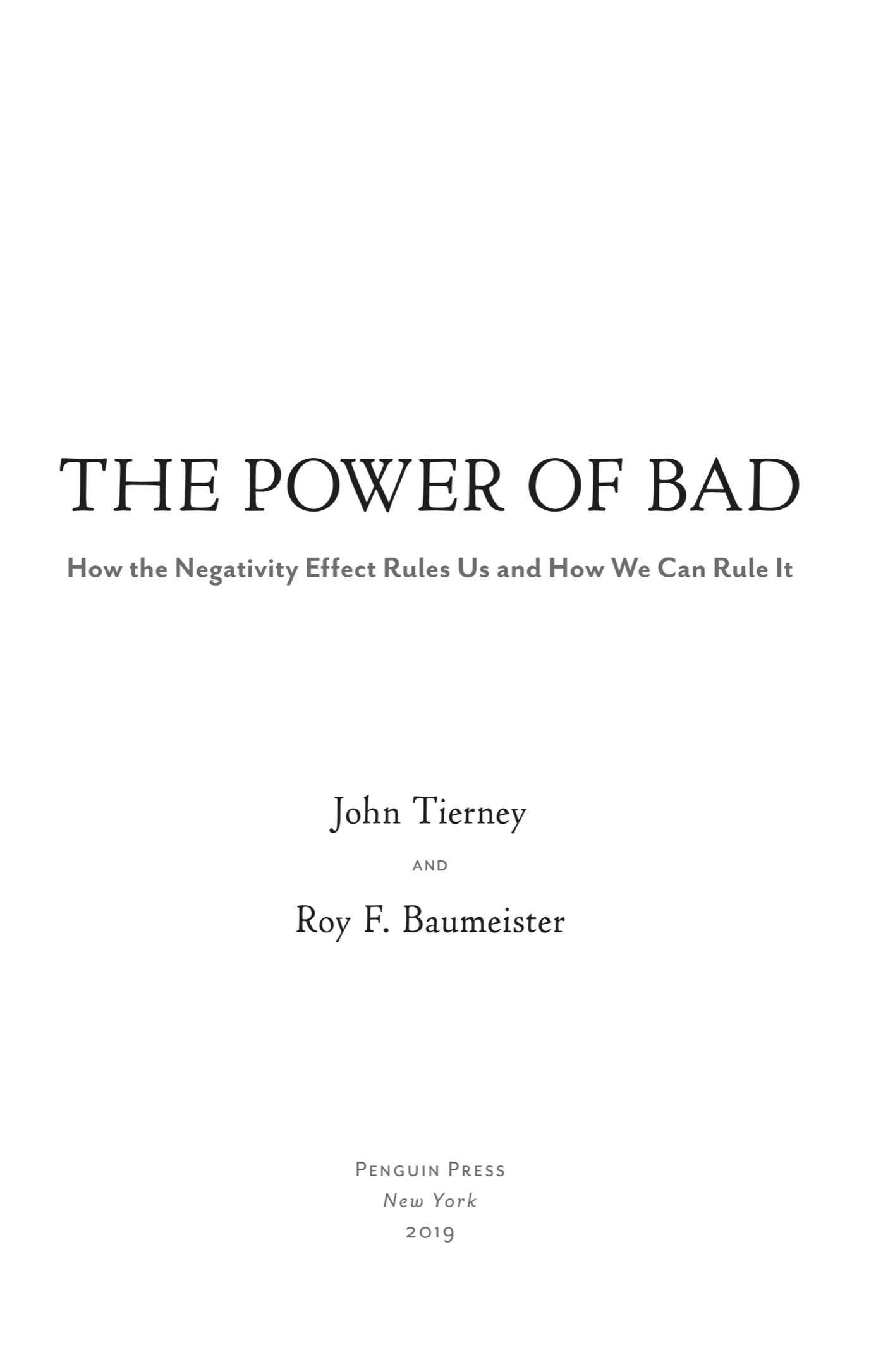
PENGUIN PRESS
An imprint of Penguin Random House LLC
penguinrandomhouse.com
Copyright 2019 by John Tierney and Roy F. Baumeister
Penguin supports copyright. Copyright fuels creativity, encourages diverse voices, promotes free speech, and creates a vibrant culture. Thank you for buying an authorized edition of this book and for complying with copyright laws by not reproducing, scanning, or distributing any part of it in any form without permission. You are supporting writers and allowing Penguin to continue to publish books for every reader.
LIBRARY OF CONGRESS CATALOGING-IN- PUBLICATION DATA
Names: Tierney, John (John Marion), author. | Baumeister, Roy F., author.
Title: The power of bad : how the negativity effect rules us and how we can rule it / John Tierney and Roy F. Baumeister.
Description: New York : Penguin Press, 2019. | Includes bibliographical references and index.
Identifiers: LCCN 2019017303 (print) | LCCN 2019019184 (ebook) | ISBN 9781594205521 (hardcover) | ISBN 9781101616468 (ebook) | ISBN 9781984879172 (international edition)
Subjects: LCSH: Negativism.
Classification: LCC BF698.35.N44 T54 2019 (print) | LCC BF698.35.N44 (ebook) | DDC 158.1dc23
LC record available at https://lccn.loc.gov/2019017303
Cover design by Christopher Brian King
Version_1
Take the bad with the good, we stoically tell ourselves. But thats not how the brain works. Our minds and lives are skewed by a fundamental imbalance that is just now becoming clear to scientists: Bad is stronger than good.
This power of bad goes by several names in the academic literature: the negativity bias, negativity dominance, or simply the negativity effect. By any name, it means the universal tendency for negative events and emotions to affect us more strongly than positive ones. Were devastated by a word of criticism but unmoved by a shower of praise. We see the hostile face in the crowd and miss all the friendly smiles. The negativity effect sounds depressingand it often isbut it doesnt have to be the end of the story. Bad is stronger, but good can prevail if we know what were up against.
By recognizing the negativity effect and overriding our innate responses, we can break destructive patterns, think more effectively about the future, and exploit the remarkable benefits of this bias. Bad luck, bad news, and bad feelings create powerful incentivesthe most powerful, in factto make us stronger, smarter, and kinder. Bad can be put to perfectly good uses, but only if the rational brain understands its irrational impact. Beating bad, especially in a digital world that magnifies its power, takes wisdom and effort.
The negativity effect is a simple principle with not-so-simple consequences. When we dont appreciate the power of bad to warp our judgment, we make terrible decisions. Our negativity bias explains things great and small: how countries blunder into disastrous wars, why neighbors feud and couples divorce, how economies stagnate, why applicants flub job interviews, how schools are failing students, why football coaches punt much too often. The negativity effect destroys reputations and bankrupts companies. It promotes tribalism and xenophobia. It spreads bogus scares that have left Americans angrier and Zambians hungrier. It ignites moral panics among both liberals and conservatives. It poisons politics and elects demagogues.
Bad is universally powerful, but it is not invincible. You are most affected by the negativity effect during your younger years, when you most need to learn from failures and criticism. As you age, the need to learn diminishes while perspective increases. Old people tend to be more contented than young people because their emotions and judgments arent as skewed by problems and setbacks. They counteract the power of bad by appreciating pleasures each day and recalling happy moments instead of dwelling on past miseries. Their lives may not seem better by objective standards (particularly if they have health problems), but they feel better and can make sounder decisions because they can afford to ignore unpleasant learning opportunities and focus on what brings joy.
Thats the sort of wisdom were promoting in this book. Well explain how to use the power of bad when its beneficial and overcome it when its not. Thanks to a recent surge of studies of the negativity effect, researchers have identified strategies for coping with it. Evolution has left us vulnerable to bad, which rules a primal region of the brain in all animals, but it also has equipped the more sophisticated regions of the human brain with natural cognitive tools for withstanding bad and employing it constructively. Today these tools are more essential than ever because there are so many more skilled purveyors of fear and vitriolthe merchants of bad, as we call them, who have prospered financially and politically by frightening the public and fomenting hatred.
Well show how to deploy the rational brain to keep bad at bay in both private and public lifein love and friendships, at home and school and work, in business and politics and government. Above all, we want to show how good can win in the end. It is not as immediately powerful and emotionally compelling as bad, but good can prevail through persistence, intelligence, and force of numbers.
By learning how the negativity bias affects you and everyone else, you see the world more realisticallyand less fearfully. You can consciously override the impulses that cause crippling insecurities, panic attacks, and phobias like the fear of heights or public speaking. A phobia is a discrete illustration of the power of bad: an exaggerated reaction to the possibility of something going wrong, an irrational impulse that prevents you from enjoying life to its fullest. Phobias can be overcome, and so can more generalized problems once you understand the negativity effect.
Instead of despairing at a setback, you can look for ways to benefit from it. Instead of striving to be a perfect parent or partner, you can concentrate on avoiding the basic mistakes that matter much more than your good deeds. In any relationship, you can learn how to stop fights before they begin, or at least prevent them from spiraling out of control, by recognizing how easily a small affront can be misinterpreted and exaggerated, especially when romantic partners are trying to make sense of each other. At work, you can avoid the pitfalls that ruin careers and doom enterprises.
Font size:
Interval:
Bookmark:
Similar books «How the Negativity Effect Rules Us and How We Can Rule It»
Look at similar books to How the Negativity Effect Rules Us and How We Can Rule It. We have selected literature similar in name and meaning in the hope of providing readers with more options to find new, interesting, not yet read works.
Discussion, reviews of the book How the Negativity Effect Rules Us and How We Can Rule It and just readers' own opinions. Leave your comments, write what you think about the work, its meaning or the main characters. Specify what exactly you liked and what you didn't like, and why you think so.

